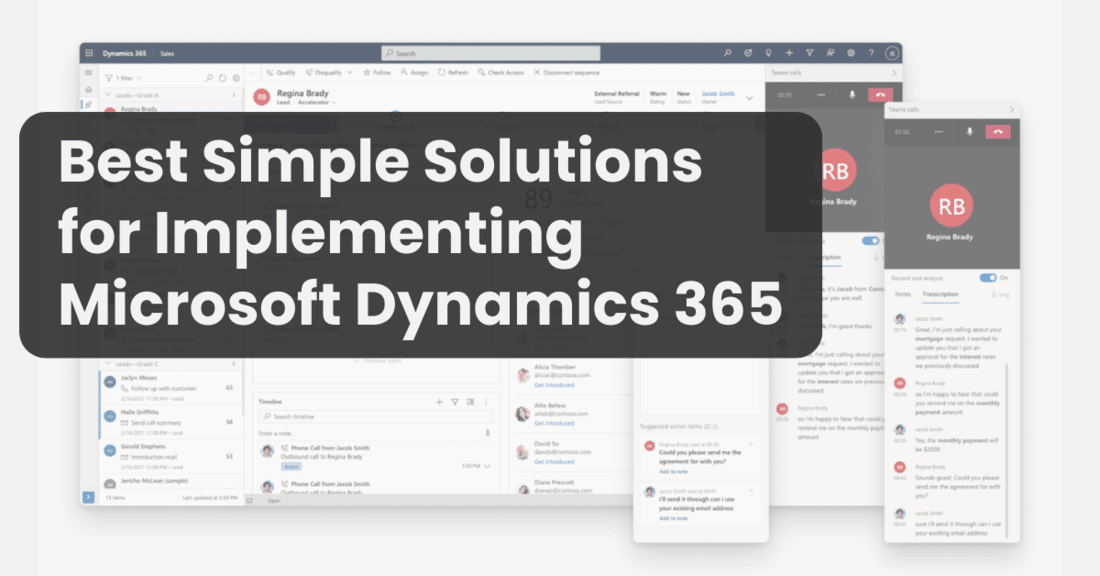
Dynamics 365 is a cloud-based enterprise software suite that can help you improve customer service, sales, marketing, loyalty program and operations. It is a strong tool that may assist you in automating company processes, increasing productivity, and making smarter decisions.
However, implementing Dynamics 365 can be a complex and challenging process. There are numerous aspects to consider, and getting it correctly is critical. This blog post will provide you with some best practices for implementing Dynamics 365 solutions.
What is Dynamics 365?
Dynamics 365 is a comprehensive suite of intelligent business applications offered by Microsoft. It combines CRM and ERP functionalities into a unified platform, enabling organizations to seamlessly manage their customer relationships, streamline operations, and drive growth.
Microsoft Dynamics 365‘s cloud-based infrastructure gives organisations the flexibility and scalability they want to respond to changing market dynamics and stay ahead of the competition.With the harnessing power of advanced analytics, automation, and artificial intelligence, Dynamics365 empowers organizations to make data-driven decisions and unlock new opportunities for success.
Why Implement Dynamics 365?
Implementing Dynamics 365 offers numerous advantages for businesses seeking to enhance their operations and stay competitive in today’s digital landscape. By integrating various business functions, such as sales, marketing, finance, and customer service, into a single platform, Dynamics 365 breaks down information silos and fosters collaboration across teams. This integration enables organizations to gain a holistic view of their customers, streamline processes, and improve overall efficiency.
Additionally, It provides advanced tools for data analysis, enabling businesses to derive actionable insights and make informed decisions that drive growth and profitability and also provides a flexible solution that can be adjusted to match the unique demands of each organisation thanks to its user-friendly interface and lots of customization features.
What are the Benefits of Implementing Dynamics 365?
Implementing Dynamics 365 brings a multitude of benefits to organizations. Firstly, it enables businesses to deliver personalized customer experiences by leveraging a comprehensive view of customer data.
This personalized approach fosters customer loyalty, improves satisfaction, and increases the likelihood of repeat business. Secondly, Dynamics 365 automates manual tasks, streamlines workflows, and reduces redundant processes, resulting in significant time and cost savings. This enhanced efficiency allows employees to focus on strategic initiatives and value-added activities. Furthermore, Microsoft Dynamics offers real-time insights and analytics, allowing businesses to measure performance, discover patterns, and make data-driven choices.
Finally, as a cloud-based solution, Dynamics 365 offers scalability and flexibility, allowing businesses to easily adapt and grow as their needs evolve.
What are the Benefits of Implementing Dynamics 365?
- Streamlined Operations: Dynamics 365 integrates various business functions, such as sales, marketing, finance, and customer service, into a unified platform, eliminating silos and promoting collaboration.
- Enhanced Customer Experiences: By providing a comprehensive view of customer data, Dynamics 365 enables personalized interactions, improves customer satisfaction, and fosters loyalty.
- Improved Efficiency: Automation of manual tasks, streamlined workflows, and reduced redundancies result in increased productivity and cost savings.
- Data-Driven Decision Making: Dynamics 365 provides real-time insights and analytics, empowering organizations to make informed decisions based on accurate data.
- Scalability and Flexibility: As a cloud-based solution, Dynamics 365 offers scalability, allowing businesses to easily adapt and grow as their needs evolve.
- Mobile Accessibility: With mobile apps, users can access critical information and perform tasks on the go, increasing productivity and responsiveness.
Identify your needs. What do you need Dynamics 365 to do for you? Do you need a CRM system, a marketing automation platform, or a customer service solution? Once you know your needs, you can start to look at different Dynamics 365 solutions.
Planning for Success
Before embarking on the implementation journey, careful planning is vital. Begin by outlining your short- and long-term business objectives. Next, assess your current business processes to identify pain points and areas for improvement. This assessment will help you understand your specific needs and tailor the Dynamics 365 solution accordingly.
Finally, develop a comprehensive project plan outlining timelines, resources, and key milestones to ensure a smooth and successful implementation.
Bringing Dynamics 365 to Life
Selecting the right deployment option is crucial for a successful Dynamics 365 implementation. Depending on what you require, you may pick from locally, a cloud-based or hybrid implementations.
Once the deployment option is decided, configure the system to align with your unique processes and workflows. Provide comprehensive training to users across your organization to ensure smooth adoption and maximum utilization of the platform’s capabilities. Finally, when all preparations are in place, it’s time to go live and begin reaping the benefits of Dynamics 365.
Sustaining Success: Support and Maintenance
To maximize the value of your Dynamics 365 implementation, ongoing support and maintenance are essential. Provide continuous training and support to your users, ensuring they have the knowledge and resources to leverage the platform effectively. Regularly monitor your system, identify areas for improvement, and make necessary changes to optimize performance. Keep your system up to date with the latest Microsoft versions & improvements to take advantage of new features and increased security.
Conclusion
In this guide, we explored the significance of Dynamics 365 and its remarkable benefits for businesses. By defining business goals, careful planning, successful implementation, ongoing support, and embracing continuous improvements, organizations can harness the full potential of Dynamics 365. To learn more about Dynamics 365 or to initiate your implementation journey, contact a Dynamics 365 partner today.
Ready to elevate your business with Dynamics 365? Contact us now to explore the endless possibilities and transform your organization for long-term success.



